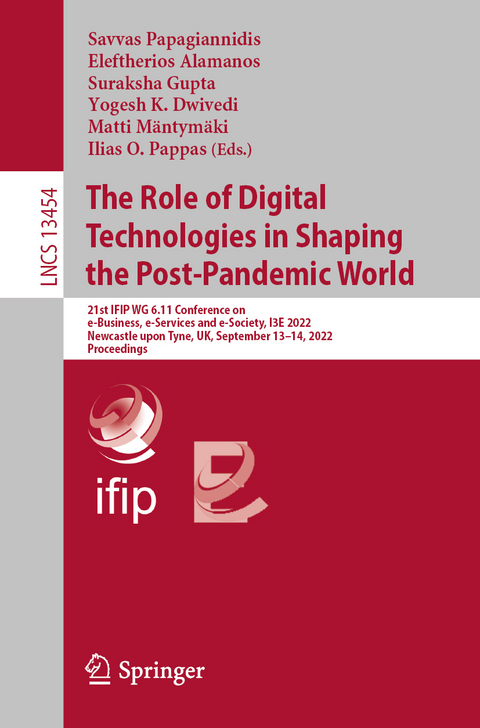
The Role of Digital Technologies in Shaping the Post-Pandemic World
Springer International Publishing (Verlag)
978-3-031-15341-9 (ISBN)
The 37 papers presented in this volume were carefully reviewed and selected from 72 submissions. They were organized in topical sections as follows: Artificial intelligence; Data and Analytics; Careers and ICT; Digital Innovation and Transformation; Electronic Services; Health and Wellbeing; Pandemic; Privacy, Trust and Security.
Artificial intelligence.- Artificial Intelligence adoption for FinTech industries- An exploratory study about the disruptions, antecedents and consequences.- The Role of Organizational Culture on Artificial Intelligence Capabilities and Organizational Performance.- Artificial intelligence ambidexterity, adaptive transformation capability, and their impact on performance under tumultuous times.- AI Technologies for Delivering Government Services to Citizens: Benefits and Challenges.- From responsible AI governance to competitive performance: The mediating role of knowledge management capabilities.- The "Other" agent: Interaction with AI and its implications on social presence perceptions of online customer experience.- Deriving Design Principles For AI-Adaptive Learning Systems: Findings from Interviews with experts.- The Impact of Functional and Psychological Barriers on Algorithm Aversion- An IRT Perspective.- Data and Analytics.- Opportunities and Threats of Learning Analytics in Higher Education: The Students' Perspective.- Methods and Tools for Social Media Analytics to Support Citizen Relationship Management: A Dataset Analysis of Tweets from Germany and South Africa.- The Impact of Machine Learning-Based Techniques on the Scouting and Screening Processes of Early-Stage Venture Capital Firms.- Extended SESIM: A tool to support generation of Synthetic Datasets for Human Activity Recognition.- Careers and ICT.- Virtual Internships as Employer-led Initiatives: Success Criteria and Reflections on the Diversification of Internships.- Teachers' preparedness for integrating Programming and Computational thinking in Art and Crafts.- Factors Influencing Women's it Career Choice in South Africa.- Digital Innovation and Transformation.- Digital transformation in the public sector: Investigating success factors in IRIDA system.- The Role of Digital Transformation in Fostering Transparency: An e-Court System Case Study.- How can hackathons facilitate employee-driven digital innovation in public organizations?.- Agility as a Driver of Digital Transformation - a Literature Review.- Clustering design science research based on the nature of the designed artifact..- Information Systems Strategy: A Multiple Criteria Decision Analysis perspective for business performance in SMEs.- Electronic Services.- The role of quality, trust, and empowerment in explaining satisfaction and use of chatbots in e-government.- The Experiential View of Regressive Discontinuance.- Acceptance of Common Service Centers versus Self-Service e-Government Portal: An Uncertainty Reduction Perspective.- Factors affecting adoption of eWOM communications: A synthesis of research using meta-analysis.- The Use of Structuration Theory in Empirical Information Systems Research- A Systematic Literature Review.- Health and Wellbeing.- Affordances of sleep-tracking: insights from smart ring users.- Understanding the Patients' Usage of Contactless Healthcare Services: Evidence from the post-COVID-19 Era.- Motivations and Challenges Related to the Use of Fitness Self-Tracking Technology.- Pandemic.- Who's the bigger Brand after COVID-19 pandemic? An assessment of Fan engagement during Euro 2020.- Online Shopping Behaviour in South Africa during the COVID-19 Pandemic.- Technology legitimation and user resistance: the NHS COVID-19 app.- The impact of improvisational and dynamic capabilities on business model innovation during COVID-19: a composite-based approach.- The Ephemeral and Information Systems Research: Conceptualizing Ephemerality in a Post-Pandemic World.- Modelling User Experience, Emotions and Concernsfor Predicting Firm Response -the Case of Low-Cost Carriers during Pandemic.- Privacy, Trust and Security.- Toward a GDPR Compliant Blockchain Governance Framework.- Voice Assistants: (Physical) Device Use Perceptions, Acceptance, and Privacy Concerns.
| Erscheinungsdatum | 20.08.2022 |
|---|---|
| Reihe/Serie | Lecture Notes in Computer Science |
| Zusatzinfo | XIV, 500 p. 75 illus., 32 illus. in color. |
| Verlagsort | Cham |
| Sprache | englisch |
| Maße | 155 x 235 mm |
| Gewicht | 776 g |
| Themenwelt | Informatik ► Office Programme ► Outlook |
| Sozialwissenschaften | |
| Wirtschaft ► Allgemeines / Lexika | |
| Wirtschaft ► Betriebswirtschaft / Management ► Marketing / Vertrieb | |
| Schlagworte | Artificial Intelligence • Communication Systems • Computer Networks • Computer Security • Data communication systems • E-Commerce • Economics • e-government • Electronic Commerce • Human-Computer Interaction (HCI) • information systems • Information Technology • mobile computing • Network Protocols • Quality of Service (QoS) • Signal Processing • Software Design • Software engineering • Telecommunication networks • Telecommunication Systems • telecommunication traffic • User Interfaces |
| ISBN-10 | 3-031-15341-3 / 3031153413 |
| ISBN-13 | 978-3-031-15341-9 / 9783031153419 |
| Zustand | Neuware |
| Informationen gemäß Produktsicherheitsverordnung (GPSR) | |
| Haben Sie eine Frage zum Produkt? |
aus dem Bereich


